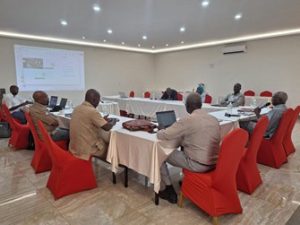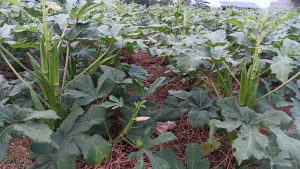TAAT facilitates seed roadmap to boost agricultural productivity in Benin

The Beninese food system is set to experience a new boom, thanks to improved access to quality and certified seeds being facilitated for farmers.
Following the creation of the Beninese Seed and Plant Development Company (SODESEP), a consultative process to develop a harmonized roadmap for more efficient, sustainable and inclusive seed systems is underway as part of the Seed System Summit in Benin, which is being held from June 20 to 22 in Cotonou, with a view to boosting agricultural productivity.
“This summit aims to support the achievement of an agricultural revolution in Benin through the establishment of an economically sustainable seed system for priority crops: rice, corn, cassava, soybeans, livestock, fish, vegetables and sorghum/millet, market gardening, fodder crops and aquaculture,” according to Dr. Ir. Angelo C. Djihinto, Scientific Director of the National Institute of Agricultural Research of Benin (INRAB).
It will help to understand the state of the seed system in the sub-region in general and in Benin, with a focus on agricultural policy and research, he emphasizes.
National stakeholders, representatives of relevant national institutions and agricultural development support projects examine, for each speculation, the state of production and institutional arrangements, the challenges and opportunities for strengthening the sub-sector, with the support of international experts from various backgrounds.
A consolidated action plan for the seed roadmap for products will also be validated and the institutions to implement it will be designated.
The Cotonou summit is “a boon to further support the efforts made by the government in the agricultural sector” and “will allow us to identify concrete and innovative solutions to strengthen our seed system and propel our agriculture to new heights”, hopes Dr Françoise Assogba Komlan, Secretary General of the Ministry of Agriculture, Livestock and Fisheries (MAEP).
Gaps to be filled despite the improvement observed in recent years, “efforts still need to be made to improve the current levels of production and processing of agricultural products,” admits the minister’s representative. One of the required conditions, she indicates, is the continuous production of sufficient quantities of quality plant material.
“Seeds are the first inputs and constitute the essential element for the sustainability of agricultural production, contributing 15 to 30% of total production, or even 45% with effective management of other inputs,” adds the scientific director of INRAB.
With figures to support his argument, Dr Solomon Gizaw, Head of the Technologies for African Agricultural Transformation (TAAT) Clearinghouse, shows the large gaps that Benin needs to fill in terms of productivity in agri-food value chains.
For example, the yield of cassava, which is around 12 tonnes of roots per hectare, could be doubled or tripled to reach 20 to 30 tonnes, or even 40 tonnes, he says.
That of rice which is less than 4 t/ha (3.85 t/ha on average over the period 2018-2022, according to the DSA/MAEP) could be doubled and even reach 10 t/ha as in Egypt.
The productivity of corn, which is on average 1.2 t/ha, is still very low, while it can reach 6 t/ha and even more. Both are also important in other sectors, notably aquaculture and livestock farming. These and many more reasons made it necessary for a consortium of stakeholders from Benin and across Africa are to organise a summit to draw a seed roadmap for the West African country.
The consortium includes the Government of Benin, Technologies for African Agricultural Transformation (TAAT)of the African Development Bank, Building an Economically Sustainable Integrated Cassava Seed System, Phase 2 (BASICS-II) project of the International Institute of Tropical Agriculture (IITA), the Sasakawa Africa Association (SAA) in Nigeria, Sahel Consulting Ltd and Mennonite Economic Development Associates (MEDA).
Recent Stories
Related Stories
- Seed System: TAAT rallies Stakeholders for a Seed Roadmap for Benin
- BENIN: TAAT and partners convene stakeholders for a seed roadmap
- TAAT and the imperatives of food systems transformation in Benin
- COTE D’IVOIRE: TAAT and Partners convene stakeholders for a seed roadmap
- Dakar 2 Summit: Development partners pledge $30 billion to boost food production in Africa





